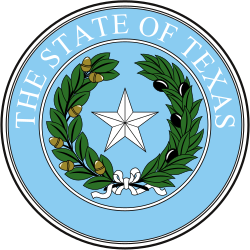| |||||||||||||||||||||||||||||||||||||
16 of the 31 seats in the Texas Senate 16 seats needed for a majority | |||||||||||||||||||||||||||||||||||||
|---|---|---|---|---|---|---|---|---|---|---|---|---|---|---|---|---|---|---|---|---|---|---|---|---|---|---|---|---|---|---|---|---|---|---|---|---|---|
| |||||||||||||||||||||||||||||||||||||
 Senate results by district Republican hold Democratic hold No election | |||||||||||||||||||||||||||||||||||||
| |||||||||||||||||||||||||||||||||||||
| Elections in Texas |
|---|
 |
The 2010 Texas Senate elections took place as part of the biennial United States elections. Texas voters elected state senators in 16 State Senate districts. The winners of this election served in the 82nd Texas Legislature. State senators typically serve four-year terms in the Texas State Senate, but all Senators come up for election in the cycles following each decennial redistricting. As such, all of the seats up for this election were for two-year terms, with senators up for re-election in the following 2012 Texas State Senate elections.
Contents
- Background
- Predictions
- Summary of race results
- Close races
- Summary of results by State Senate district
- Notable races
- References
Following the 2008 Texas Senate election, the Republicans maintained effective control of the Senate with nineteen members to the Democrats' twelve.
To claim control of the chamber from Republicans, the Democrats needed to gain four seats. In the end, no seats changed hands.
